China Digital
“Daddy Ma, Are You OK?” – Jack Ma’s Situation Discussed on Chinese Social Media
Public sentiments on Jack Ma have shifted, but the fans still defend their idol.
Published
5 years agoon

Chinese tech superhero Jack Ma has become a hot topic on international social media this month since he has been missing in action for weeks, while Alibaba is facing an anti-monopoly investigation. Ma seems to have fallen out of favor, not just with authorities but also with many Chinese web users.
This month, the alleged ‘disappearance’ of Alibaba founder Jack Ma made headlines in various English-language media, from Reuters to CNN and the Financial Times.
The direct reason for speculation about Jack Ma’s whereabouts was his absence at Africa’s Business Heroes, a talent show he helped create in which Ma was part of the finale judge panel. According to FT.com, the final – which won’t be broadcasted until spring – took place in November.
Although an Alibaba spokesperson explained Ma’s absence from the show as a “schedule conflict” that made it impossible for the tech tycoon to participate, many Twitter users directly tied his ‘suspected missing’ to a critical speech he gave at the Shanghai Bund Finance Summit on October 24 of 2020.
In this speech, Ma made critical remarks on how China’s financial market is regulated and supervised. Kevin Xu at Interconnected provides an English translation of this speech here.
On November 3rd, two days before Alibaba’s fintech subsidiary Ant Group was set to raise around $37 billion with the biggest initial public offering of all time, Chinese regulators abruptly suspended the process. A report by the Wall Street Journal claimed that Chinese President Xi Jinping personally made the decision to halt the IPO of Ant Group after years of rising tensions between Ma and the government.
Pressure on Jack Ma and Alibaba further increased in December when Chinese regulators launched an anti-monopoly investigation into Alibaba and the Ant Group.
Alibaba announced the investigation of its company on its official Weibo channel on December 25 of 2020.
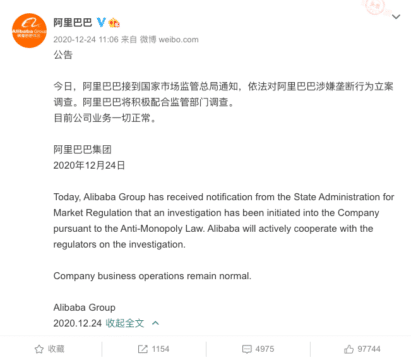
On December 25, People’s Daily also reported the anti-monopoly investigation. The state newspaper hosted a hashtag page about the matter on Sina Weibo (#人民日报再评阿里巴巴被调查#) which garnered over 240 million views. They wrote:
“Large Internet platform companies should take the lead in strengthening industry self-discipline, in further enhancing their sense of social responsibility, and in safeguarding a favorable Internet economic ecosystem. The Internet industry has never been, and should never become, a place that is outside the law for anti-monopoly. Regarding platform economy, reinforcing anti-monopoly regulations is never a “winter” for the industry – it is just a new starting point for better and healthier development.”
Although Chinese official media have since not reported much on the issue, and have not published about Ma’s alleged ‘disappearance’, Ma’s whereabouts and his situation has become a much-discussed topic on various Chinese social media platforms.
Jack Ma in Short
Being among the top 20 richest people in the world, Jack Ma is world-famous as the founder of Alibaba, a multinational tech company specializing in e-commerce that was founded in 1999.
Jack Ma, whose Chinese name is Ma Yun 马云, was born in Hangzhou in 1964 to a family of low status. His life story has been retold in many books. Ma was bullied at school, had poor math skills, and flunked the entrance exam twice before he was accepted into the Hangzhou Teacher’s Institute, where he graduated in 1988 with a Bachelor of Arts in English.
Ma had been interested in English since he was a young boy. He would cycle to the main hotel in his city to connect with foreign tourists, acting as their local tour guide in return for English classes. The name ‘Jack’ was given to him by one of the tourist friends he made at that time.
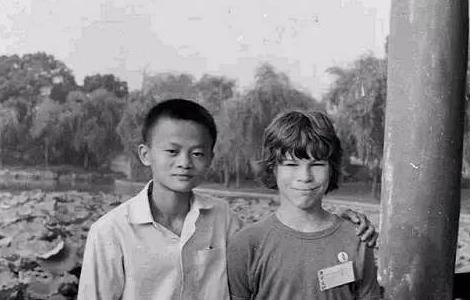
image via kknews.cc
Ma went on to become an English teacher and barely even touched a keyboard before he traveled to the US in 1995 as an interpreter. It was during this trip that he was first introduced to the internet, after which he became inspired to set up his own commercial web site in China – a web site named ‘China Pages’ for Chinese businesses.
Although that business flopped, Jack Ma founded Alibaba in 1999, which would turn into an internet giant influencing virtually all corners of China’s digital world. The Alibaba Group now operates numerous businesses, including Taobao, TMall, AliExpress, and the Ant Group.
Ma’s success is a source of inspiration to many, and his ‘crazy Jack’ energetic behavior and willingness to make fun of himself has only made him and his story all the more captivating.

A younger Ma in one of his fun song-and-dance appearances – as Snow White.
Ma officially stepped down as Alibaba’s CEO in 2019 but is still the company’s largest individual shareholder.
“What’s up with Ma Yun?”
Until recently, Jack Ma was one of the more popular Chinese celebrities on social media. Jack Ma quotes, memes, videos, or stories would frequently go viral.
As one of the most respected and powerful entrepreneurs of China, bookstores have entire sections dedicated to Jack Ma and his role as a business magnate, the richest man of China, and also as a welldoer and an inspiring influential.

Books about Jack Ma.
Whatever Ma would say or do would go trending, with many people praising what he did, what he said, or where he went.
In 2017, the meeting between US President Trump and Alibaba’s Ma was a big topic of discussion, with many Chinese web users taking pride in Ma’s meeting with Trump, calling him the perfect ambassador to China in their dealings with Trump. “Ma Yun [Jack Ma] for president!” was a much recurring phrase.
It is a phrase you won’t read as much, if at all, on Chinese social media these days anymore. The silence surrounding Jack Ma recently has led to speculation and reflections on his current situation.
On Chinese search engine Baidu, the search prediction reflects web users’ confusion over his whereabouts; upon searching for ‘Ma Yun’ in the first week of January, the first five automatic predictions are the following:
– Jack Ma fled abroad
– Did Jack Ma really flee abroad?
– Jack Ma sentenced to prison
– Jack Ma disappeared
– Jack Ma Shanghai Bund speech
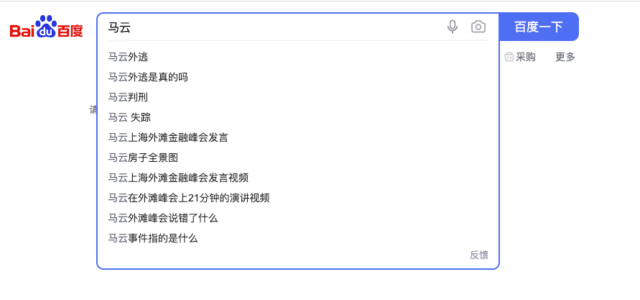
On Douyin (the Chinese TikTok), the first sentence to come up when searching for Ma Yun, is “What’s up with Ma Yun?”

On Weibo, where Jack Ma has over 26.4 million followers on his official account, there have not been any new posts since October 17. But Ma’s last post, which talks about an educational event, is still attracting new comments every few minutes.

“Daddy Ma, come on, ok? We’re rooting for you,” one commenter writes.
“We haven’t seen you in a long time, Brother Ma,” some write: “When will you come back into the public arena?”, with others saying: “Teacher Ma, what happened?”
But besides the messages from those who seem concerned about the well-being of the tech tycoon, there are many angry ones.
Some blame Ma for praising the ‘996’ work system (working from 9am-9pm, 6 days a week). In 2019, Ma called the 12-hour working day a “blessing,” causing much controversy online. Because the death of a young employee at Pinduoduo was also linked to her long working hours, the ‘996’ work system is a hot topic this week, with many condemning how Chinese tech companies are exploiting their employees and revisiting Ma’s 2019 comments.
Others also turn to Jack Ma’s Weibo page to complain about the shutdown of Alibaba’s music streaming app Xiami. Although Xiami only holds a small percentage of China’s music streaming market – apps such as QQ Music and KuGou are more popular – there are still many people who have been using the app for years and hate to see it go: “Why can’t you give it another chance, why can’t you take care of our Xiami!?”
And then there are those commenters who, in light of the recent developments and anti-monopoly investigations, call Ma a “greedy capitalist” and a “bloodsucker.” “Maybe he’ll be punished,” one person writes: “Is that a ‘blessing’ too?” “I went from being a fan to a hater,” another commenter writes, with others calling him an opportunist.
Changing Sentiments on Social Media
Jack Ma used to be an idol for many young people in China, but now it seems they have started to oppose him. On the Chinese video sharing site Bilibili, mainly used by younger generations, comments appearing in some videos featuring Ma are filled with anger and scolding.
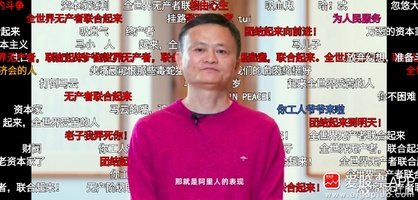
This shift in Ma’s popularity among young people was recently also explained by young Chinese vlogger Yu He in this video, who argues that young people do not adore Jack Ma in the same way older Chinese people do.
Ma’s vision of working really hard, praising the ‘996’ work culture, and “everybody can be successful if you really try hard” was an inspiration to previous generations, but many post-90s people in China today – who are struggling in a highly competitive job market – do not have a lot of faith in Ma’s work philosophy when their everyday lives are not about working to live, but about living to work. To them, Ma’s ideas about working around the clock to get further in life do not make sense, as some feel they are working themselves to death while others get rich.
There is also anger over consumer lending platform Huabei, a product of Alibaba’s Ant Group. Huabei previously encouraged users to spend more money in its ads, and its platform makes it very easy to spend money first and pay it back later – even for those who might not oversee the long-term consequences of excessive debt.
The question of why Jack Ma seems to have fallen out of favor with many Chinese people is also a topic of discussion on question-and-answer platform Zhihu.com.
One popular analysis by the e-commerce account Zhiser claims that Jack Ma used to be supported by the ordinary people because he made it possible for so many of them to make money through the Taobao marketplace platform, which started in 2003. Alibaba’s Alipay online payment platform made it possible for common people to conveniently transfer money without extra fees.
But over recent years, Zhiser argues, Alibaba’s business strategies have changed in such a way that its own profits are maximized and small sellers are negatively impacted.
With the arrival and growth of Alibaba’s Tmall, where only brand owners or authorized dealers can open an online store & where transaction commissions are much higher, the traffic of small sellers on the Taobao marketplace has been reduced. Alibaba’s activities are increasingly focused on benefiting the bigger companies – and itself -, while small entrepreneurs are increasingly struggling to be noticed and make money.
Without the means to open their own Tmall shop, without the capital to afford advertisement and paid promotions for their shops, the small sellers are watching helplessly how the big boys dominate the platform algorithms and take the money, Zhiser explains.
Alibaba is now also increasingly focusing on the fruit & vegetable market. There’s Alibaba’s Hema Fresh supermarket brand, for example, with big plans to open hundreds of stores nationwide in the upcoming years. The rise of Alibaba’s fresh food businesses directly impacts the livelihood of ten thousands of ordinary Chinese who have their own small vegetable shops or street stalls – exactly those people who are already in vulnerable social groups.
Although the rise of Alibaba was once a great opportunity for common people, the changing business strategies have now resulted in Jack Ma getting more enemies, including small entrepreneurs, small sellers and buyers, offline shops, offline vendors, etc.
For them, the ‘Alibaba dream’ of using the power of the Internet and technological advancement to enable small businesses and young people to share the benefits of free trade has lost credibility.
“These years, Jack Ma has played the role of the destroyer rather than the savior,” the author writes. His article received over 10,500 endorsements.
Zhiser’s article reflects a perspective that surfaces in many places. “We believed him, that he really was making things better for us,” another blogger writes.
Others think that Jack Ma was true about his intentions and dreams when he was a teacher and then started his business, but changed when he became surrounded by money-driven big investors, causing him to become alienated from his former ideas and philosophies, losing touch with China’s younger generation, the small shop owners he promised to serve and the ordinary people.
“He changed China, he changed the world”
Despite the recent criticism of Ma, many people still defend and support him. There are even those who criticize him but still express their admiration for him.
Regarding the criticism coming from post-90s generations, one Chinese web user commented:
“You have no idea what it was like before Jack Ma came around. You’re too young to know. If you want to go back [in that time], I suggest you go live on the moon.”
Discussing the changing sentiments regarding Ma, Zhihu author Qing Rui writes:
“Jack Ma is a great entrepreneur of this era. He changed China, he changed the world. A lot of nonsensical people scold him for damaging China’s real economy, while he’s actually worked hard to improve the efficiency of the business sector, which has not only greatly boosted the real economy, but also greatly improved the living standards of the Chinese people.”
It is a sentiment shared by many, who express that they think the recent shift in views on Ma is uncalled for, or reminding people of the positive effect Ma and his businesses have had on China’s development.
“Those who scold Jack Ma are brainless idiots,” some write.
“How is it possible for the public opinion on Daddy Ma shifting 180 degrees? It’s like throwing stones at someone who fell down,” one Weibo user from Shenyang writes.
Although perhaps less crowded than before, online ‘Ma Yun Fanclubs’ are still active. One Weibo fan writes: “Let’s all hope our favorite idol Ma Yun will smoothly sail through this crisis!”
As for the ‘disappearance’ of Jack Ma that has previously been reported – although Ma has not been out in public, it is highly unlikely that he is actually missing.
CNBC reported on January 5 that the Chinese billionaire is lying low, according to a person familiar with the matter.
When famous Chinese actress Fan Bingbing got caught up in a tax evasion scandal in 2018, her ‘disappearance’ also made headlines in international media. After months of silence and wild rumors, the actress returned to social media with a public apology. She was ordered to pay taxes and fines worth hundreds of millions of yuan.
Meanwhile, Jack Ma’s Weibo page is still receiving dozens of new messages. In between the “evil capitalist” scoldings, there are some who really hope Ma will come back to public life soon: “We’ll support you, teacher Ma, don’t give up!”
By Manya Koetse
Follow @WhatsOnWeibo
Spotted a mistake or want to add something? Please let us know in comments below or email us. First-time commenters, please be patient – we will have to manually approve your comment before it appears.
©2021 Whatsonweibo. All rights reserved. Do not reproduce our content without permission – you can contact us at info@whatsonweibo.com.
Manya is the founder and editor-in-chief of What's on Weibo, offering independent analysis of social trends, online media, and digital culture in China for over a decade. Subscribe to gain access to content, including the Weibo Watch newsletter, which provides deeper insights into the China trends that matter. More about Manya at manyakoetse.com or follow on X.

China Arts & Entertainment
Yearnings, Dreamcore, and the Rise of AI Nostalgia in China
From China’s first soap opera Yearnings to the rise of AI-fueled nostalgia.
Published
2 months agoon
July 2, 2025
The year is 1990, and the streets of Beijing’s Fangshan District are eerily quiet. You can almost hear a pin drop in the petrochemical town, as tens of thousands of workers and their families huddle around their televisions, all tuned to the same channel for something groundbreaking: China’s very first soap opera, Yearnings (渴望 Kěwàng).
Yearnings tells the story of Liu Huifang (刘慧芳), a female factory worker from a traditional working-class family in Beijing, and her unlikely marriage to university graduate Wang Husheng (王沪生), who comes from a family of intellectuals. When Liu finds an abandoned baby girl, she adopts her and raises her as her own, against her husband’s wishes.
The couple is unaware that the foundling is actually the illegitimate child of Wang’s snobbish sister, Yaru. After Liu and Wang have a biological son, the marriage comes under further pressure, eventually leading to divorce. Liu is left as a single mother, raising two children on her own.
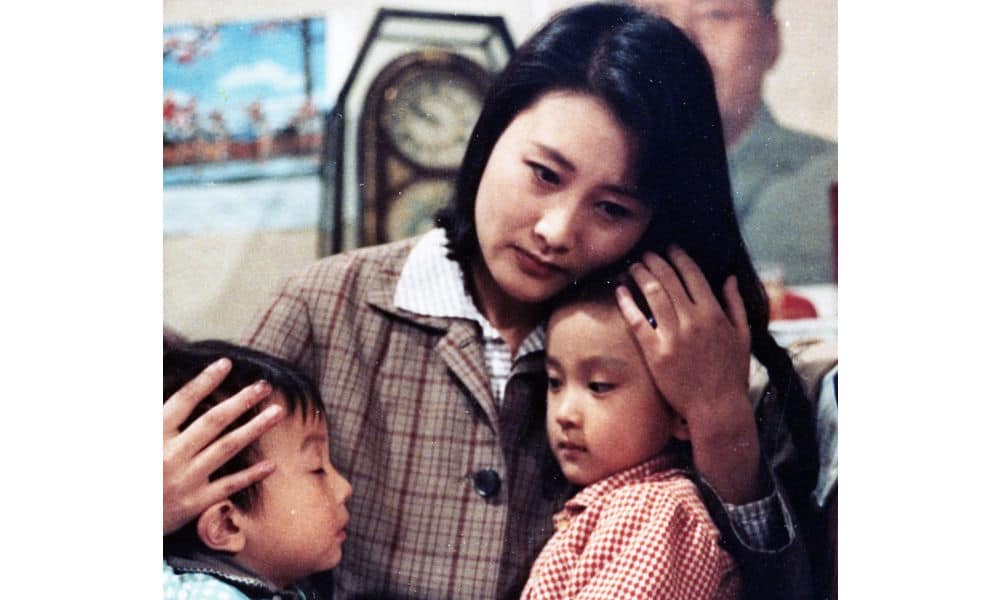
Still from Yearnings, via OurChinaStory.
Drawing inspiration from foreign dubbed television shows, Yearnings was produced as China’s first truly domestic, long-form indoor television drama. Spanning 50 episodes, the series traces a timeline from the onset of the Cultural Revolution in the 1960s through to the late 1980s—one of the most turbulent periods in modern Chinese history.
Before the series aired nationally on CCTV and achieved record viewership, the first station to air Yearnings in the Beijing region was the Yanshan Petrochemical TV Station (燕山石化电视台), China’s first major factory TV station (厂办电视台) located in Fangshan District.
Here, in this town of over 100,000, Yearnings garnered an astonishing and unprecedented 98% audience share. The series was truly groundbreaking and became a national sensation—not just because it was China’s first long-form television drama, or because it was a locally produced drama that challenged the long-standing monopoly of state broadcaster CCTV, but because Yearnings marked a major shift in television storytelling.
Until then, Chinese TV stories had always revolved around communist propaganda, or featured great heroes of the revolution. Yearnings, on the other hand, was devoid of political content and focused on the hopes and dreams of ordinary people and their everyday struggles—love, desire, marital tension, single motherhood—topics that had never before been so openly portrayed on Chinese television.
The show’s creators had perfectly tapped into what was changing: the Communist Party was slowly withdrawing from private life, and people were beginning to see themselves less defined by their work unit and more by their home life—as consumers, as partners and parents, as citizens of a new China filled with aspirations for the future. Yearnings’ storyline was a reflection of that.
Chinese-Style “Nostalgia Core”
Yearnings marked a cultural turning point, coinciding with the rapid spread of TV sets in Chinese households. In 1992, economic reforms triggered a new era in which Chinese media became increasingly commercialized and thriving, before the arrival of the internet, social media, and AI tools once again changed everything.
Today, Yearnings still is a topic that often comes up in Chinese online media. On apps like Douyin, old scenes from Yearnings are reposted and receive thousands of shares.
📌 It’s emblematic of a broader trend in which more netizens are turning to “nostalgia-core.” In Chinese, this trend is known as “中式梦核” (Zhōngshì Mènghé), which literally means “Chinese-style dreamcore.”
Dreamcore is an internet aesthetic and visual style—popular in online communities like Tumblr and Reddit—that blends elements of nostalgia, surrealism, and subconscious imagery. Mixing retro images with fantasy, it evokes a sense of familiarity, yet often feels unsettling and deserted.
The Chinese-style dreamcore (中式梦核), which has become increasingly popular on platforms like Bilibili since 2023-2024, is different from its Western counterpart in how it incorporates distinctly Chinese elements and specifically evokes the childhood experiences of the millennial generation. Content tagged as “Chinese-style dreamcore” on Chinese social media is often also labeled with terms like “nostalgia” (怀旧), “childhood memories” (童年回忆), “when we were little” (小时候), and “Millennial Dream” (千禧梦).
According to the blogging account Yatong Local Life Observer (娅桐本地生活观察), the focus on the millennial childhood can be explained because the formative years of this generation coincided with a decade of rapid social change in China —leaving little in today’s modern cities that still evokes that era.
🌀 Of course, millennials in the West also frequently look back at their childhood and teenage years, particularly the 1980s and 1990s—a trend also embraced by Gen Z, who romanticize these years through media and fashion. In China, however, Gen Z is at the forefront of the “nostalgia-core” trend, reflecting on the 1990s and early 2000s as a distant, almost dreamlike past. This sense of distance is heightened by China’s staggering pace of transformation, modernization, and digitalization over the past decades, which has made even the recent past feel remote and irretrievable.
🌀 Another factor contributing to the trend is that China’s younger generations are caught in a rat race of academic and professional competition, often feeling overwhelmed by the fast pace of life and the weight of societal expectations. In this high-pressure environment—captured by the concept of “involution” (内卷)—young people develop various coping mechanisms, and digital escapism, including nostalgia-core, is one of them. It’s like a cyber-utopia (赛博乌托邦).
🌀 Due to the rise of AI tools available to the general public, Chinese-style nostalgia core has hit the mainstream because it’s now possible for all social media users to create their own nostalgic videos and images—bringing back the 1990s and early 2000s through AI-generated tools, either by making real videos appear more nostalgic or by creating entirely fictional videos or images that recreate scenes from those days.
So what are we seeing? There are images and videos of stickers kids used to love, visuals showing old classrooms, furniture, and children playing outside, accompanied by captions such as “we’re already so far apart from our childhood years” (example).
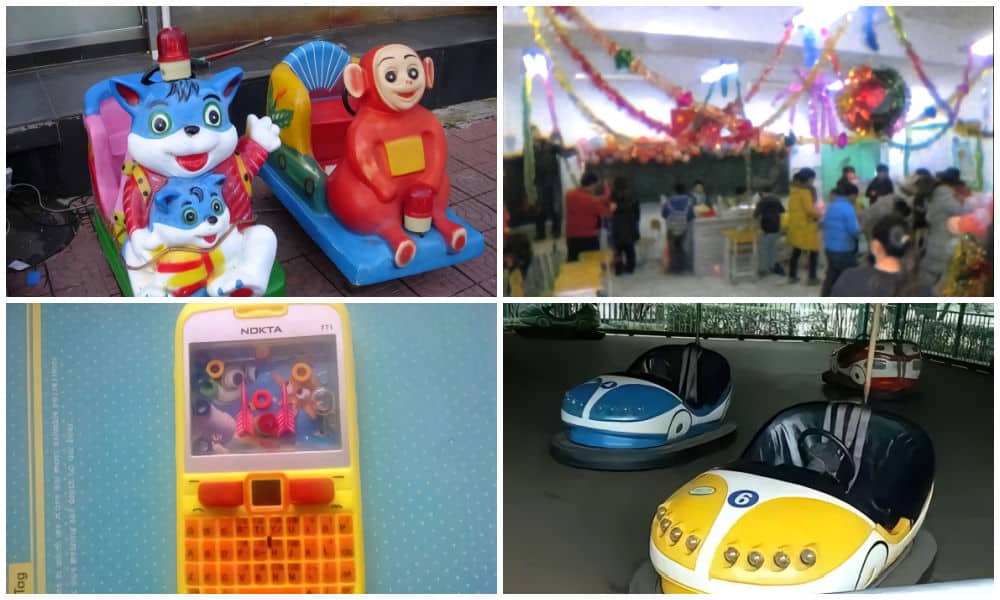
Images displayed in Chinese Dreamcore.
And notably, there are videos and images showing family and friends gathering around those old big TVs as a cultural, ritualized activity (see some examples here).

Stills from ‘nostalgia core’ videos.
These kinds of AI-generated videos depict a pre-mobile-era family life, where families and communities would gather around the TV—both inside and outside—from classrooms to family homes. The wind blows through the windows, neighbors crack sunflower seeds, and children play on the ground. Ironically, it’s AI that is bringing back the memories of a society that was not yet digitalized.
Nowadays, with dozens of short video apps, streaming platforms, and livestream culture fully mainstream in China—and AI algorithms personalizing feeds to the extreme—it sometimes feels like everyone’s on a different channel, quite literally.
In times like these, people long for an era when life seemed less complicated—when, instead of everyone staring at their own screens, families and neighbors gathered around one screen together.
There’s not just irony in the fact that it took AI for netizens to visualize their longing for a bygone era; there’s also a deeper irony in how Yearnings once represented a time when people were looking forward to the future—only to find that the future is now looking back, yearning for the days of Yearnings.
It seems we’re always looking back, reminiscing about the years behind us with a touch of nostalgia. We’re more digitalized than ever, yet somehow less connected. We yearn for a time when everyone was watching the same screen, at the same time, together, just like in 1990. Perhaps it’s time for another Yearnings.
By Manya Koetse
(follow on X, LinkedIn, or Instagram)
Sources (other sources included in hyperlinks)
Koetse, Manya. 2016. “From Woman Warrior to Good Wife – Confucian Influences on the Portrayal of Women in China’s Television Drama.” In Stefania Travagnin (ed), Religion and Media in China. New York: Routledge.
Rofel, Lisa B. 1994. Yearnings: Televisual Love and Melodramatic Politics in Contemporary China. American Ethnologist 21(4):700-722.
Wang, Dan (汪丹). 2018. “《渴望》的艺术价值” [The Artistic Value of Yearnings].” Originally published in Beijing Daily (北京日报), October 12, 2018. Reprinted in Digest News (文摘报), October 20, 06 edition. Also see Sohu: 当年红遍大江南北的《渴望》.
Wang Min and Arvind Singhal. 1992. “Kewang, a Chinese television soap opera with a message.” Gazette 49: 177-192.
Zhuge Kanwu. 2021. “重温1990《渴望》:苦得“刘慧芳”希望被导演写“死” [Revisiting 1990’s Yearnings: The Suffering Liu Huifang Hoped to Be Written Off by the Director]. Zhuge Dushu Wu (诸葛读书屋), January 22. https://wapbaike.baidu.com/tashuo/browse/content?id=b699ee532cf79f862bfa14ad.
Spotted a mistake or want to add something? Please let us know in comments below or email us. First-time commenters, please be patient – we will have to manually approve your comment before it appears.
©2025 Whatsonweibo. All rights reserved. Do not reproduce our content without permission – you can contact us at info@whatsonweibo.com.
China Digital
China’s Major Food Delivery Showdown: What to Know about the JD.com vs. Meituan Clash
Consumers are profiting from the full-blown delivery war between JD.com and Meituan—but is it just the same game with a different name?
Published
4 months agoon
April 30, 2025By
Ruixin Zhang
In April 2025, China’s food delivery sector witnessed a somewhat dramatic development, which attracted major attention online, when Chinese e-commerce giant JD.com publicly challenged food delivery leader Meituan.
On April 21, JD.com posted a noteworthy open letter titled “To All Fellow Food Delivery Rider Brothers” (各位外卖骑手兄弟们) on Weibo. In this letter, they accused Meituan (though not explicitly naming them) of monopolistic practices, after the company allegedly forced their delivery staff to stop accepting JD’s delivery orders. If riders chose to deliver for both companies anyway, they’d risk being blacklisted.
JD therefore accused Meituan of unethical behavior, neglecting their workers’ welfare, and pressuring part-time couriers to choose between platforms.
In their letter, JD vowed to support the freedom of Chinese delivery riders to accept orders from various platforms, and pledged to support those who were being blacklisted by offering them sufficient order volumes and full-time positions with benefits, including employment opportunities for their partners.
The bold move, dubbed the “421 Food Delivery Incident” by netizens, ignited widespread online debate.
“Underdog” JD vs. Meituan: The Start of a New Delivery War
JD.com is a household name in China’s e-commerce industry, best known for its electronics retail business. In recent years, it has expanded into fresh groceries, online supermarkets, and instant delivery services. Meanwhile, China’s food delivery market has long been dominated by Meituan (美团) and Ele.me (饿了么), the latter owned by Alibaba. Before a recent online controversy brought attention to it, many people weren’t even aware that JD had entered the food delivery space.
JD’s entry into China’s thriving food delivery market hasn’t been too long ago—the company officially only announced its JD Waimai (京东外卖) food delivery service back in February this year.
Before JD, other major tech companies like Tencent, Baidu, and ByteDance had all tried (and failed) to challenge the dominance of Meituan and Ele.me. But JD has a strong advantage: a massive logistics system with over 300,000 (!) delivery staff. Its Dada (达达) on-demand delivery and local logistics platform also has nearly 1.3 million active couriers, making JD a serious new competitor in China’s food delivery market. Not surprisingly, JD has already started hiring away talent from Meituan.
Amid JD’s growing presence, a post surfaced in April, reportedly from Meituan executive Wang Puzhong (王莆中), mocking JD’s food delivery ambitions as laughable. He used harsh language, calling JD a “cornered dog” making a desperate move (狗急跳墙). Then, on April 15, Meituan’s Flash Delivery service (美团闪送) released a video teasing JD’s supposedly slow delivery speeds (#美团闪购疑似嘲讽京东#). The video showed a dog with the caption: “Your Dongdong is still on the way” — a direct jab at JD, whose mascot is a dog and whose founder, Richard Liu (Liu Qiangdong), is nicknamed “Dongdong.”

JD swiftly hit back. On April 16, a video from an internal JD meeting was leaked, widely seen as a deliberate PR move. In the video, JD founder Richard Liu criticized the food delivery industry, claiming platforms were making excessive profits while restaurants struggled to survive. “Running a restaurant is already hard, yet platforms—just middlemen—are making a fortune,” he said. Liu added that JD would cap its profit margin at 5% and offer full social insurance to its full-time couriers—setting the tone for the official statement that followed.
Then came JD’s April 21 post, which launched a series of serious accusations against Meituan. JD claimed that Meituan had long restricted part-time couriers from working with other platforms and had failed to provide any social insurance to its full-time riders for over ten years. It also criticized Meituan’s working conditions, accusing the company of exploiting riders through algorithm-driven pressure while ignoring their safety. Additionally, JD accused Meituan of squeezing restaurants for profit, turning a blind eye to unhygienic “ghost kitchens,” and neglecting basic food safety standards. The tone of the post was sharply critical.
The attack prompted Meituan to respond publicly. That same evening, it issued a statement on its official WeChat account, denying that it had ever restricted riders from working with other platforms. Meituan also pushed back by accusing JD of mistreating its own couriers, pointing to heavy fines and unfair internal policies as the real issue.
However, Meituan’s response did little to improve its public image. On Weibo and short-video platforms, public sentiment largely turned against Meituan. That night, a netizen posted that JD CEO Richard Liu himself had delivered their JD order. Stories of Liu chatting with riders and restaurant owners quickly went viral, reinforcing his image as a down-to-earth, working-class hero—and earning JD another wave of goodwill.

At the moment, JD enjoys strong public support—not necessarily because it’s doing everything perfectly, but because it has timed its entry well, casting itself as the underdog taking on Meituan, the widely criticized corporate giant.
The Meituan Backlash
There’s no doubt that Meituan is a true giant. In 2024, the company generated a staggering RMB 300 billion (about $41 billion) in revenue. But this delivery empire has long faced ethical criticism—and JD’s recent accusations on Weibo highlight issues that many in the industry have raised before.
Meituan’s commission rates for restaurants are notoriously high, typically ranging from 15% to 25%. According to reports, around 60% of restaurants on the platform operate at a loss—even as Meituan continues to post multi-billion-yuan profits year after year. Many restaurant owners have voiced their frustration online, saying Meituan initially attracted them with generous onboarding incentives, only to gradually increase commissions, service fees, and so-called “tech support charges.” In the end, even strong sales often fail to translate into real profit. Yet with fierce competition and Meituan’s dominance in the food delivery market, many restaurants feel they have no choice but to stay.
For workers, complaints from Meituan couriers are nothing new. The faster they deliver, the more the algorithm shortens their future delivery windows, while slower deliveries result in fewer order assignments. This creates a vicious cycle, pressuring riders to break traffic rules just to meet deadlines. Unsurprisingly, their accident rate is reported to be three times higher than that of express couriers. To make matters worse, Meituan has historically provided no social insurance—neither for full-time nor part-time riders—leaving them on their own when accidents happen. As some couriers bitterly joke, “We’re not people—we’re just human batteries.”
For consumers, the concerns are just as serious. As I noted in an earlier article, Meituan’s platform increasingly hosts “ghost kitchens”—delivery-only outlets that often operate in unsanitary conditions, producing low-cost, low-quality meals to support Meituan’s Pinhaofan service and fuel ongoing price wars. It’s hard to believe Meituan isn’t aware of these practices; it simply appears to look the other way.
These examples are just the tip of the iceberg when it comes to Meituan’s ethical challenges. But for many users, they’re reason enough to delete the app—especially now that JD has positioned itself as a credible alternative.
Of course, few believe Richard Liu is driven purely by social responsibility—he’s long been skilled at presenting himself as a “man of the people.” In JD’s early days, he famously delivered electronics himself in a three-wheeler. Still, as many netizens have put it: “Judge by actions, not intentions” (君子论迹不论心). Whatever JD’s true motives, its current words and actions seem to align with the interests of ordinary consumers and workers. But the question remains: is that enough?
Different name, same game?
For many consumers, the showdown between JD and Meituan has been surprisingly entertaining, and even financially rewarding. The more intense the rivalry, the bigger the discounts. Netizens have been sharing screenshots of good deals they’ve scored from both platforms in recent days. Some media outlets have even declared, “Richard Liu is saving food delivery and changing the industry for good!”
Meanwhile, Taobao and Ele.me have also announced that they’ll be joining the big JD–Meituan showdown by making themselves more competitive. “Taobao Flash Delivery” (淘宝闪购) will now be prominently featured on the main Taobao app, and Taobao and Ele.me will be more closely integrated under Alibaba to offer customers faster delivery times and the best prices. That means more offers—and good news for consumers.
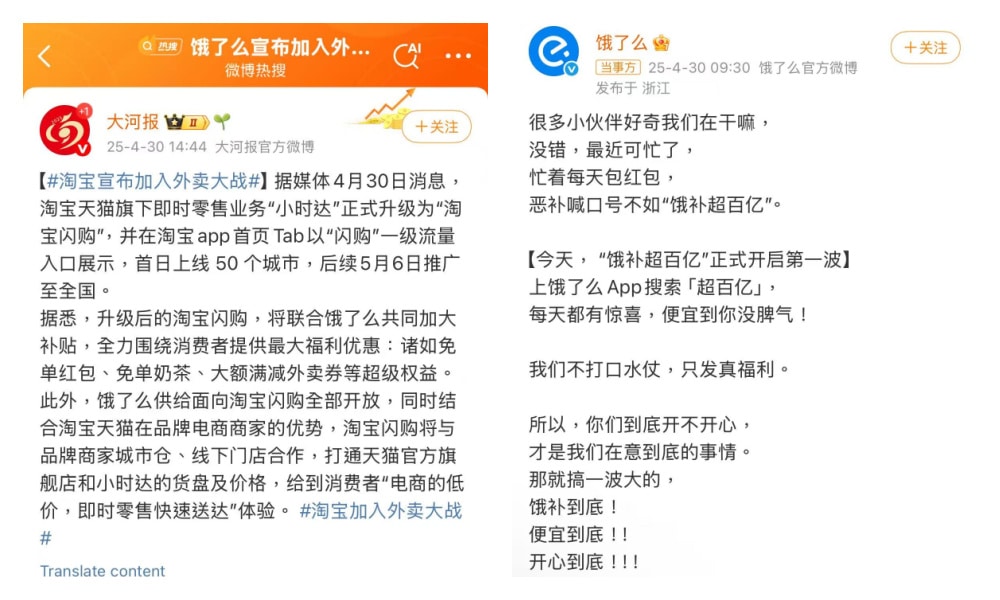
Taobao and Ele.me also join the big battle
But offline, couriers are responding more cautiously. Rider welfare has quickly become a key issue in this corporate battle—and may even become a way for platforms to stand out in a crowded market. But big promises aren’t enough. Only real, visible improvements will earn riders’ trust.
Courier A Ping (阿平) has long been sharing food delivery vlogs online. He used to work for both Meituan and Ele.me. Since April 16, he’s started posting about JD’s delivery platform, and has raised many concerns: part-time riders apparently find it hard to get orders, the system is difficult to navigate, the dispatch logic is flawed, and the navigation is poor.
In the comments section, other couriers are joining the discussion, with many agreeing that JD’s current system only works for full-time employees. “If full-timers get the full benefits, insurance and everything, then it;s probably not that easy to become one,” one wrote. “JD looks promising now, with high pay and benefits, but give it time—it’ll end up the same as the others.”
Another rider, Yu (小于) isn’t too excited about the JD-Meituan feud either. “JD’s fine system is super strict,” he said. “At the end of the day, all these platforms are the same.” Whether JD is just using this moment for PR or genuinely stepping up to take on more social responsibility—only time will tell.
By Ruixin Zhang
Independently covering digital China for over a decade. Like what we do? Support us and get the story behind the hashtag by subscribing:
edited for clarity by Manya Koetse
Spotted a mistake or want to add something? Please let us know in comments below or email us. First-time commenters, please be patient – we will have to manually approve your comment before it appears.
©2024 Whatsonweibo. All rights reserved. Do not reproduce our content without permission – you can contact us at info@whatsonweibo.com.
Subscribe
What’s on Weibo is a reader-supported publication, run by Manya Koetse (@manyapan), offering independent analysis of social trends in China for over a decade. To receive new posts and support our work, consider becoming a paid subscriber.

Get in touch
Would you like to become a contributor, or do you have any tips or suggestions? Get in touch here!

How Female Comedians Are Shaping China’s Stand-Up Boom

China Trend Watch Top 10: Putin & Kim Jong-un in Beijing, Meituan’s Upcoming Changes, Lu Xun’s Mural Controversy

China Trend Watch: Naked Sleeping Woman Claims Depression After Being Seen by Window Cleaners

Online Debates About China’s Train Traditions: No More Instant Noodles or Cigarette Breaks?

China Trend Watch: From Lhasa to Labubu

Hidden Cameras and Taboo Topics: The Many Layers of the “Nanjing Sister Hong” Scandal

Inside the Labubu Craze and the Globalization of Chinese Designer Toys

“Jiangyou Bullying Incident”: From Online Outrage to Offline Protest

The Next Labubu: What the Rise of Wakuku Tells Us About China’s Collectible Toy Wave

A Very Short Guide to China’s Most Popular Designer Toys
Popular Reads
-

 China Memes & Viral1 month ago
China Memes & Viral1 month agoHidden Cameras and Taboo Topics: The Many Layers of the “Nanjing Sister Hong” Scandal
-

 China Books & Literature10 months ago
China Books & Literature10 months agoThe Price of Writing Smut: Inside China’s Crackdown on Erotic Fiction
-

 China Society11 months ago
China Society11 months agoDeath of Chinese Female Motorcycle Influencer ‘Shigao ProMax’ Sparks Debate on Risky Rides for Online Attention
-

 China Insight4 months ago
China Insight4 months agoUnderstanding the Dr. Xiao Medical Scandal




Chin CKit
January 10, 2021 at 7:04 am
Jack Ma the Chinese Mr. Bean.
Olivier VEROT
January 11, 2021 at 1:09 pm
great post @Manya.
Very interesting to see the fight between nationalist (and army of the propaganda) and the true fan of Jack Ma.
Jack is a real leader and inspire hundred of thousand of business men in China.
He is missing creating a real problem in the society…
The fight between billionaires and state.
slitherio
January 27, 2021 at 5:09 am
We’ll support you, teacher Ma, don’t give up!